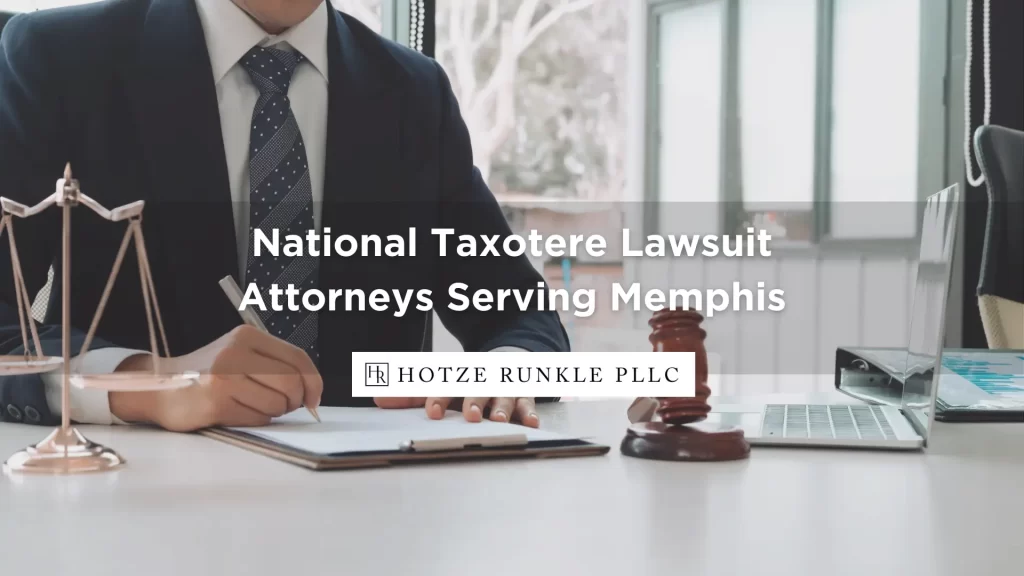
Have your eyes been watering since you began or completed chemotherapy with Taxotere? Are you noticing other unusual ocular symptoms you weren’t aware could develop? If so, Hotze Runkle PLLC can review your case to determine if you’re eligible for a lawsuit against the drug manufacturer.
Sanofi-Aventis created Taxotere to treat breast cancer, prostate cancer, stomach cancer, prostate cancer, head cancer, neck cancer, and others. Taxotere was developed to shrink cancerous cells so they don’t grow and spread to other body parts. Although successful as a cancer treatment, medical researchers found a link between Taxotere and a serious, permanent ocular condition called canalicular stenosis.
This serious side effect has prompted cancer patients and survivors throughout the country to file lawsuits and hold Sanofi-Aventis liable for the harm their drug caused.
If you are suffering from an ocular condition following your treatment with Taxotere, take our quiz to determine if you may be eligible to participate in a lawsuit.
How Taxotere Can Effect Functioning of a Vital Eye Structure
During chemo with Taxotere, you might have noticed an unexpected symptom known as epiphora. Epiphora is the excessive, uncontrollable watering of the eyes. You probably thought it was a normal side effect of chemo or irritation from allergies. However, it can signify a serious medical condition.
When an essential eye structure called a canaliculus becomes inflamed, it can block tears from funneling through the tear ducts and into the nasal cavity. Without immediate and early medical intervention, chronic inflammation could lead to the permanent closure of one or both canaliculi.
Over time, symptoms progress and can lead to canalicular stenosis. This is an irreversible medical condition with a range of symptoms, including:
- Watery eyes
- Headaches
- Light sensitivity
- Eye infections
- Dry eyes
- Eyelid swelling
- Central vision loss
- Dry eyes
- Cloudy or blurry vision
As soon as you notice any of the symptoms above, you should tell your oncologist so they can determine what medication regimen is best for you. Make an appointment with an ophthalmologist to discuss your options for treatment. You can continue chemotherapy as long as your doctors monitor your health and prevent your symptoms from worsening.
Why Does Taxotere Cause Canalicular Stenosis?
Taxotere regimens vary depending on the stage and type of cancer you have. The drug is available in pill form or intravenously. You can receive it once a week, every other week, or once every three weeks. No matter what regimen your oncologist recommends, Taxotere could cause an adverse reaction.
Medical researchers noticed the interaction between a patient’s tears and secretions from the chemo drug while performing studies. Those tears can cause inflammation as they travel through the canaliculus. If you don’t treat the inflammation, an infection can occur and result in obstructions that block tears from flowing into the nasal cavity.
As the obstructions progress, the canaliculus could close partially or entirely, resulting in canalicular stenosis. Canalicular stenosis is an irreversible condition. There isn’t a cure, but there is a surgery you could try to manage your symptoms. It’s expensive and invasive, and for some people, it’s not successful.
Determining Your Options for Canalicular Stenosis Treatment
If you’re experiencing debilitating side effects from Taxotere, there might be a way to alleviate your symptoms and prevent them from progressing any further. Dacryocystorhinostomy (DCR) is a surgical procedure that involves creating a new passageway for tears. The surgeon places a stent or uses adjacent structures near the eye to facilitate the flow of tears around the obstructed canaliculus. Instead of building up on the eye’s surface and leading to excessive eye-watering, they travel to the nasal cavity.
If the damage to your canaliculus is too severe to create a new passageway with existing structures, your doctor might be able to perform conjunctidacryocystorhinostomy (CDCR). During this surgery, the doctor inserts a small glass tube called a Jones tube through which the tears can flow as normal.
Both procedures come with risks. Some people notice an improvement in their symptoms, while others don’t find any relief. The most common problems you might encounter include:
- Tissue damage
- Eye infections
- Sinusitis
- Migrating stent or Jones tube
- Uncontrollable hemorrhaging
- Facial scarring
- Blindness
To ensure DCR or CDCR is right for you, discuss your symptoms with your doctor. An ophthalmologist will evaluate your health and determine the best options for managing your eye-watering and other associated side effects. You might have to stop using Taxotere and ask your oncologist to recommend a different chemo drug.
Seeking Compensation From a Lawsuit
 Cancer patients and survivors end up with various damages due to their diagnosis and resulting expenses. Damages come in two main categories: economic and non-economic. They both refer to the losses someone experiences after an accident or injury occurs.
Cancer patients and survivors end up with various damages due to their diagnosis and resulting expenses. Damages come in two main categories: economic and non-economic. They both refer to the losses someone experiences after an accident or injury occurs.
Economic damages are actual expenses, such as:
- Medical bills
- Lost wages
- Lost earning capacity
- Out-of-pocket costs
Non-economic damages include the physical and emotional effects of an injury, such as:
- Pain and suffering
- Emotional distress
- Mental anguish
- Diminished quality of life
- Loss of society, companionship, and consortium
Your monetary award will depend on your total damages. A jury will review the details of your case to determine a fair amount. Depending on the circumstances, you could also seek punitive damages. Instead of compensating you for your losses, it punishes the at-fault party for their actions and deters similar actions in the future. You must prove with clear and convincing evidence that the defendant displayed malicious, fraudulent, intentional, or reckless behavior.
If you want to sue Sanofi-Aventis, there’s a strict deadline you have to follow. The statute of limitations in Tennessee for product liability cases is one year. That means you only have one year from the date Taxotere caused your symptoms to file a lawsuit. If the deadline passes, you could lose your right to financial compensation in this matter.
Contact Us
Hotze Runkle PLLC has over 25 years of experience handling lawsuits in Memphis. We’re not afraid to go up against intimidating insurance companies and large pharmaceutical companies. We understand the overwhelming feeling of dealing with a legal case. We’ll be by your side throughout the process. We will walk you through each step and provide the support and advice you need. You can depend on our team of professionals to create a plan that reaches your goals.
If you want to find out how we can help you seek compensation from Sanofi-Aventis, take our Taxotere quiz today.